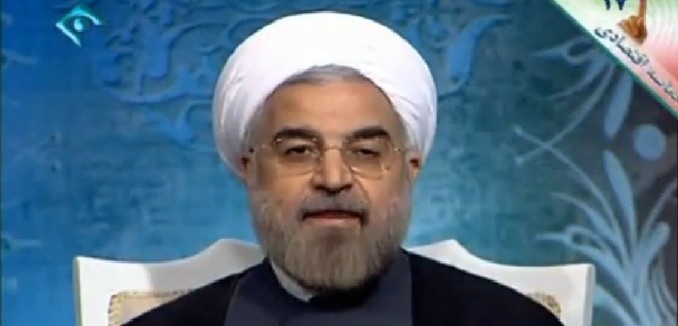Soon after it became clear to Ali Akbar Velayati that he had no chance of winning this week’s presidential election in Iran, he quickly congratulated the rest of the candidates and wished them success. “We are all competitors and friends who serve the regime well,” he said.
And indeed, putting aside how quickly the winner Hassan Rouhani was branded a “reformist” by Western and even Israeli outlets, Velayati had described him most accurately: a servant of the regime.
The incoming president of Iran was never a reformist. It is doubtful that his achievement was even a victory for the moderate camp in Iran, which on the face of it wants to replace the regime and to stop the nuclear weapons race. Rouhani, as opposed to the image that has been fashioned, was until recently known as part of the conservative camp in Iran. He is not one of those challenging the Islamist regime, and certainly not challenging Khamenei’s rule.
Rouhani’s win election should not be seen as a dramatic sign that Iran will change its line regarding either its nuclear policy or its involvement in Middle Eastern conflicts. Despite Rouhani’s declarations in the past that may suggest he seeks flexibility in the nuclear project, the reality in Iran is that these matters will remain in the hands of Khamenei and the men of the Revolutionary Guard.
Politicall Rouhani’s victory reflects power struggles within the Iranian leadership. It marks a kind of political comeback for former president President Akbar Hashemi Rafsanjani, who was Rouhani’s political godfather. Moreover, Rouhani is the breath of fresh air, a new face at the top of the Iranian leadership compared to the outgoing president, Muhamad Ahmedinejad. He was the only cleric allowed to run in the race, and will now try to bring the public, including the Tehran elites, closer to the regime of the Ayatollahs – of which he is one of the most outstanding products.
So how did a member of Iran’s Assembly of Experts and Supreme National Security Council – and a confidant of Khamenei – become the “great hope” of the moderate camp? It may be the embrace he received from the two former presidents, Khatami and Rafsanjani, rivals to Khamenei, that put him into the reformist category.
“He never called himself a reformist,” explains Dr. Soli Shahvar, who heads the Ezri Center for Iran and Gulf Studies at Haifa University. “But he uses rhetoric that is less blustery than that of Ahmedinejad, and speaks more moderately, including on the subject of nuclear negotiations.” Shahvar’s conclusion with respect to Rouhani’s win is unambiguous. “I interpret his election in one way only: The regime wanted him to win. If they had wanted one of the conservatives to win, they would have gotten four of the five conservatives to drop out of the race, paving the way for [eventual runner-up, Tehran Mayor Mohammad-Bagher] Ghalibaf to win. But they didn’t do that. Moreover, it was the regime that approved the candidacy of Rouhani alongside only seven others. This is striking evidence that Khamenei wanted Rouhani to win, both internally and externally.”
According to Shahvar, from the internal perspective, a victory for another candidate like Ahmedinejad risked provoking a renewal of the demonstrations like those of 2009. “Victory for a candidate who is perceived as more moderate yet still has the confidence of Khamenei, serves the regime in the best way. Externally, Iran today is in a very difficult situation with regard to sanctions and its international standing. A conservative president would only have increased Tehran’s isolation in the world. A victory for someone from the ‘moderate stream,’ however, will immediately bring certain countries in the international community to call for ‘giving a chance to dialogue with the Iranian moderates.’ They will ask for more time in order to encourage this stream, and it will take pressure off the regime. And so we see that in the non-disqualification of Rouhani and especially in the non-dropping-out of four of the five conservative candidates there is more than just an indication that this is the result the regime desired.”
Rouhani, in his new position as president of the country, will first of all have to bring relief in the economic crisis facing the citizens of Iran. Yet this is a nearly impossible task in light of the international sanctions which themselves are the result of the nuclear policy that has been set by the supreme leader Khamenei.
In a few months the public’s anger may well be turned against the man on whom so many Iranians, as of now, seem to have pinned their hopes.
[Photo: Viva Persia / YouTube]




